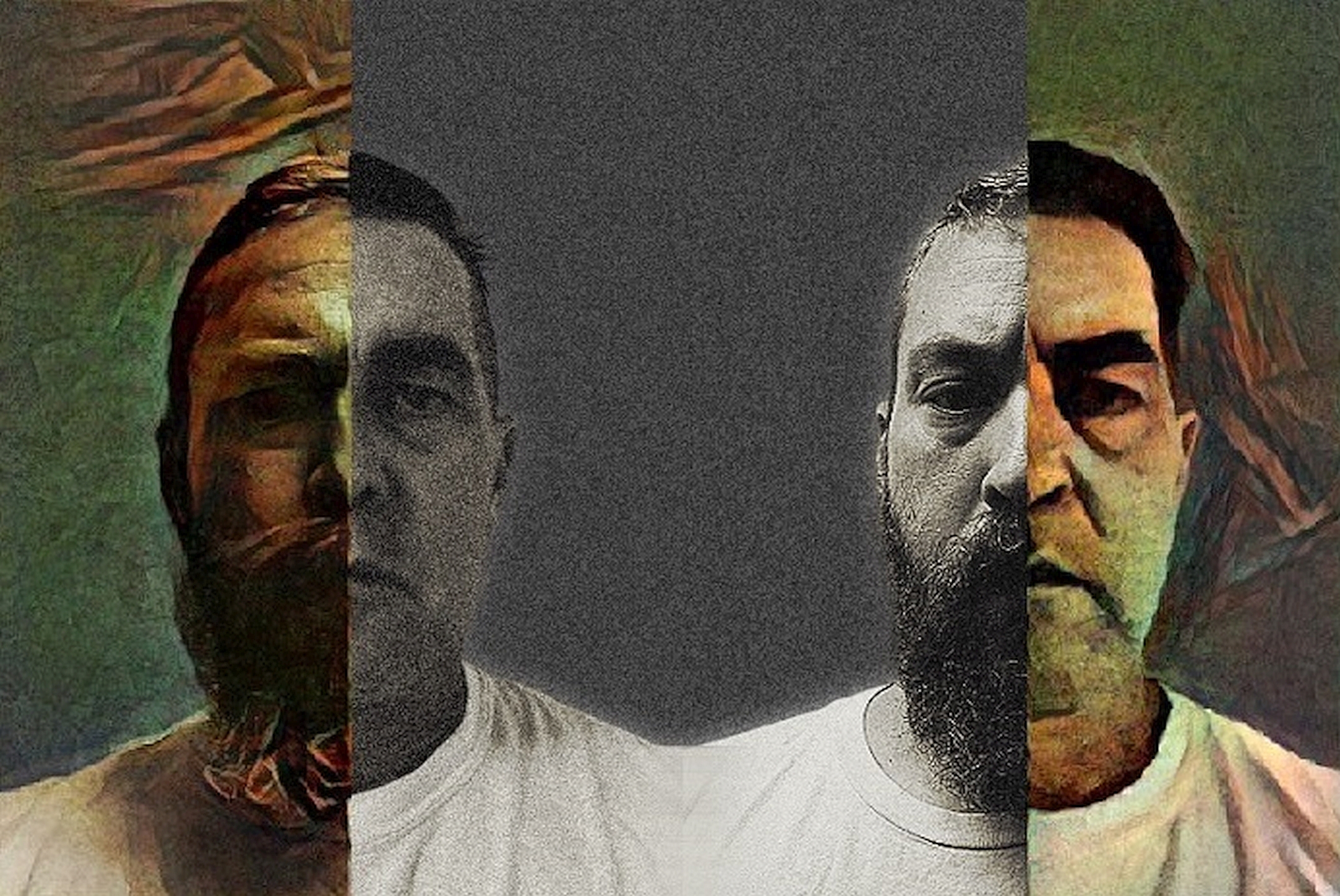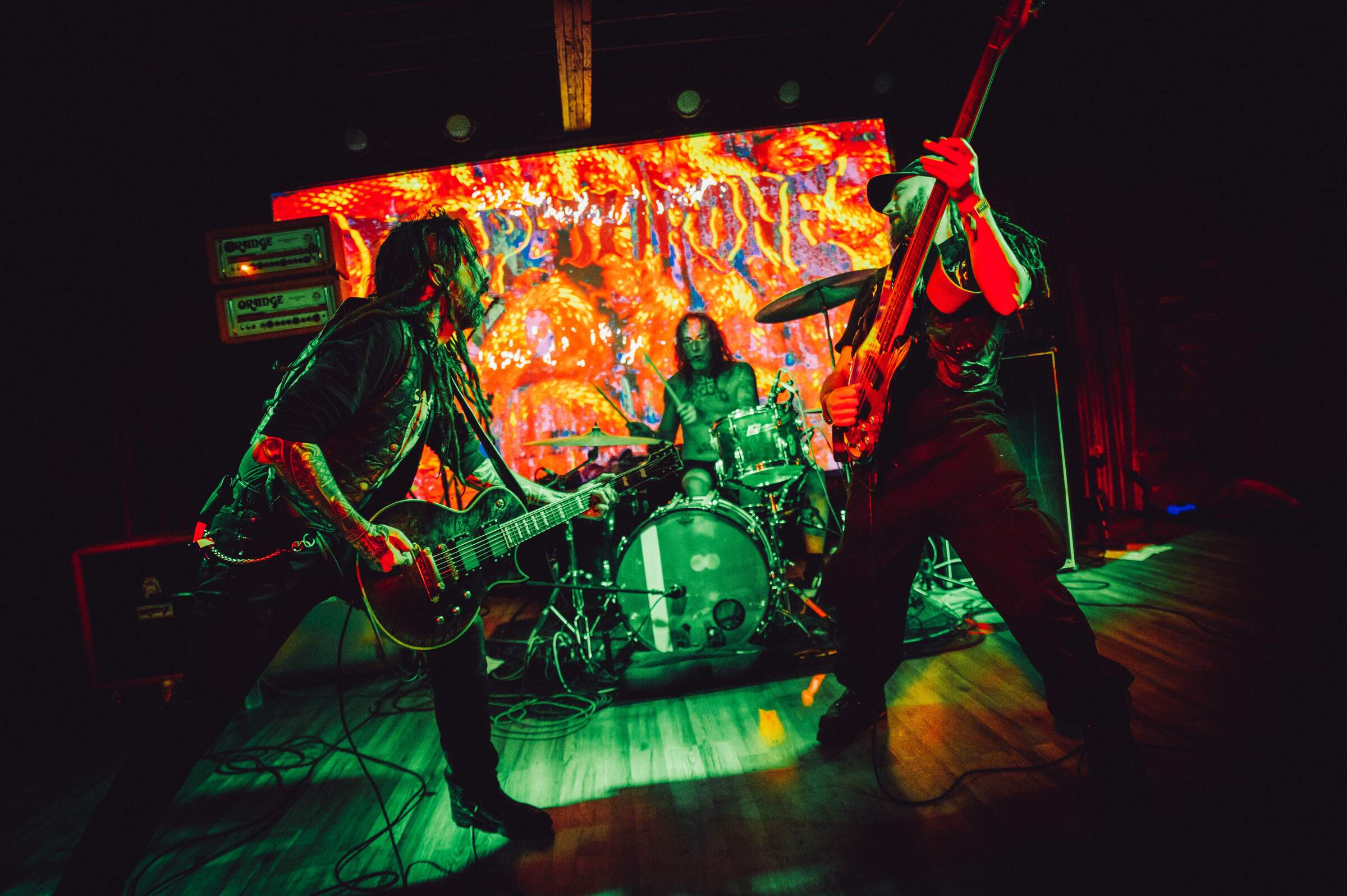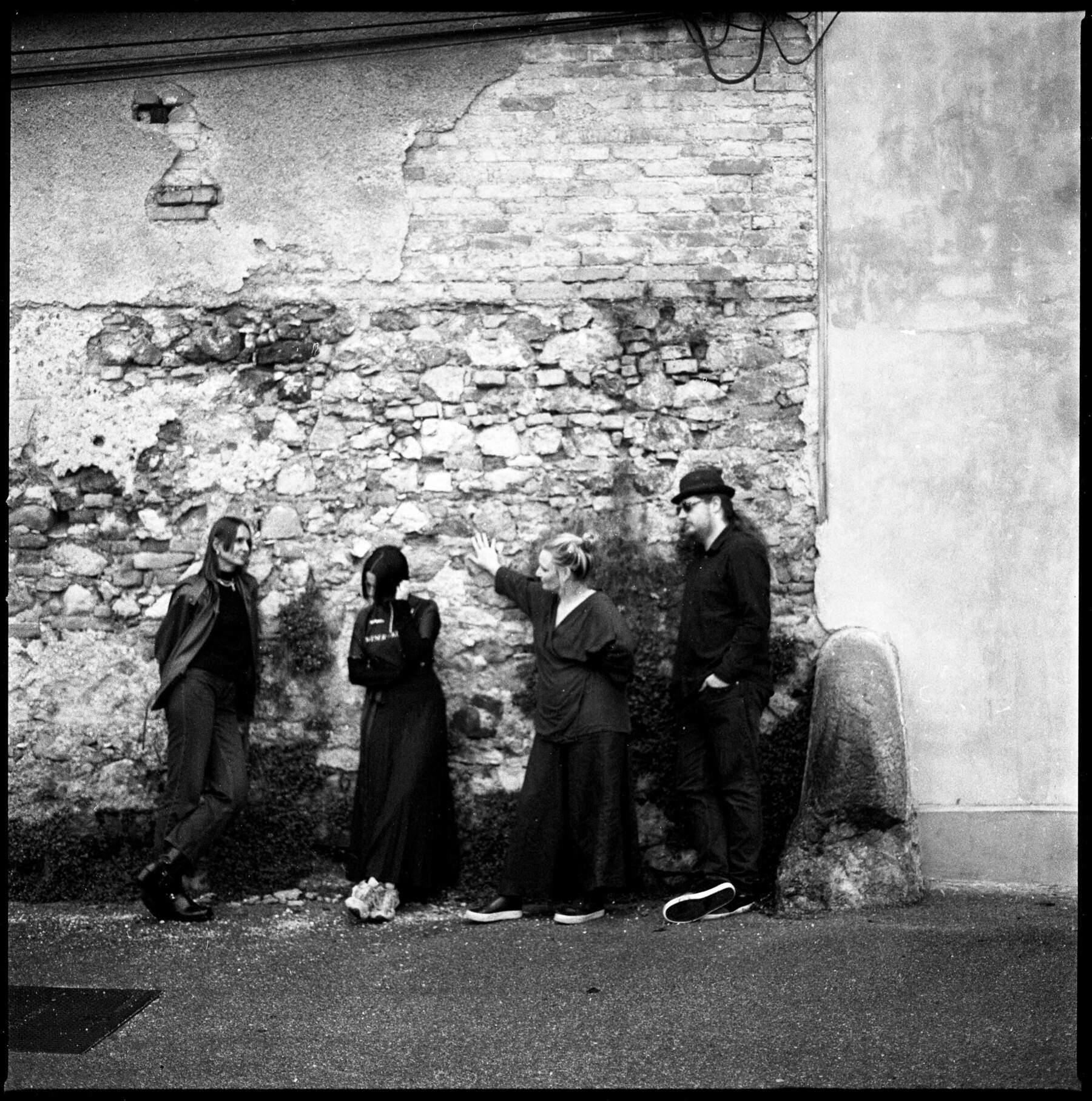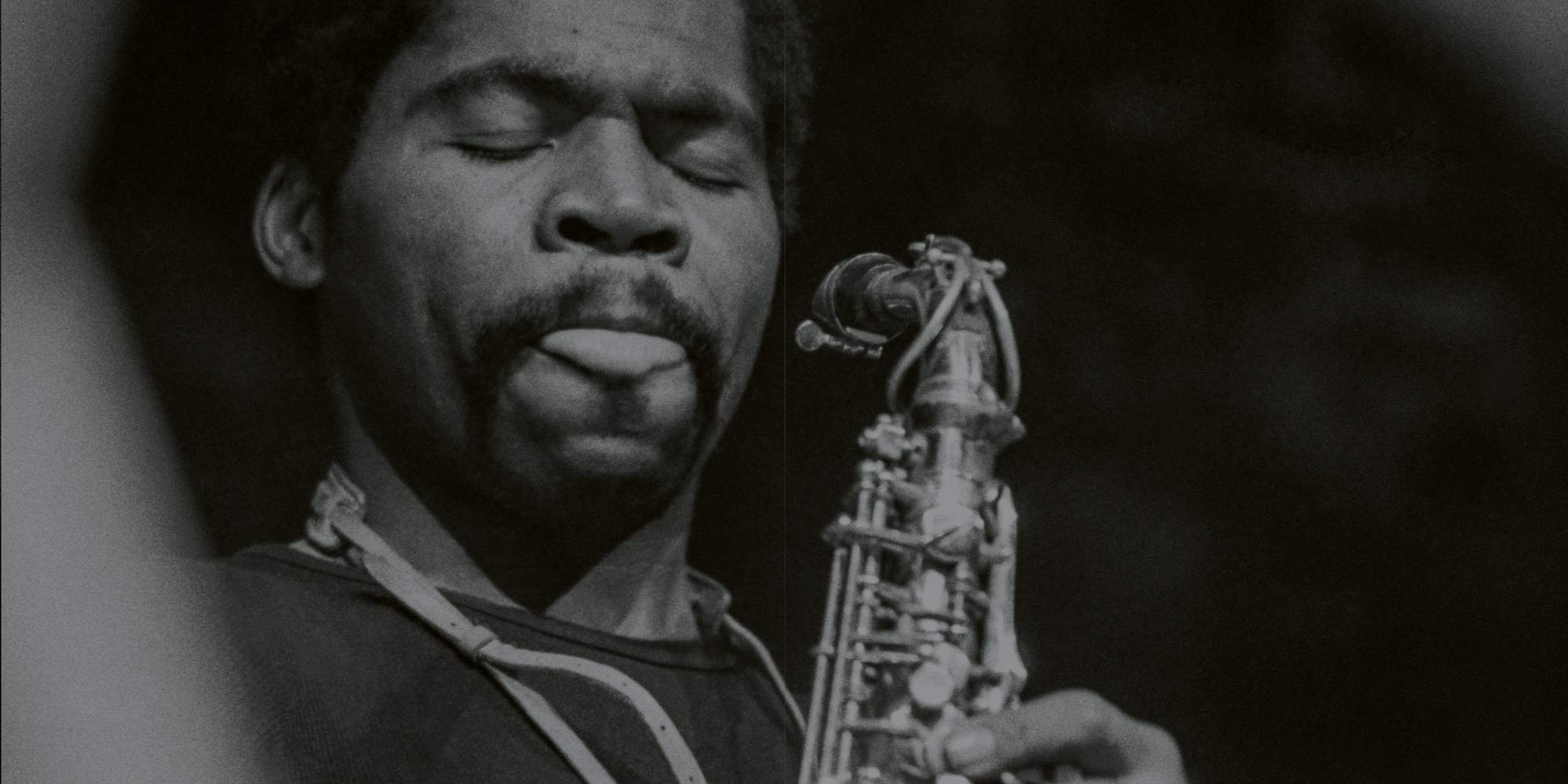Collapse Culture | Interview | New Album, ‘Drag Your Coffin My Lord’
Electronic/psychedelic hybrid duo featuring Kowloon Walled City and Bleach Everything members recently issued their second album, ‘Drag Your Coffin My Lord,’ via Pax Aeternum.
‘Drag Your Coffin My Lord’ acts in much the same way as the group’s debut – as a means of processing the dire qualities of the current zeitgeist that become more intense and overwhelming by the day. But while the new album possesses similar genre agnostic qualities to their previous work, the approach is taken to greater extremes through a synthesis of diverse components into a varied and ever-shifting panorama, with their heretofore established mix of grainy cinematic dub textures and maximalist post-punk techno propulsion augmented with cosmic disco jeremiads, Atom Age educational filmstrip synthwave, and hauntological Morlock psychedelia.
Both the group’s members have decades’ worth of background in heavier music with bands like Kowloon Walled City, US Christmas, Bleach Everything, Less Art, Strangelight, Souvenir’s Young America, and Forensics, and the sense of rawness and immediacy present in those bands shines through in Collapse Culture despite it diverging starkly from their better-known projects. Though the duo’s intention was to make a dance record, the end result is something weightier and more confrontational, a bracing and engaging sequence of battle hymns for spiritual warfare.
All music on ‘Drag Your Coffin My Lord’ was created by Ian Miller and Graham Scala in their respective homes in Oakland and Asheville, with mixing, mastering, and art handled by Scala.
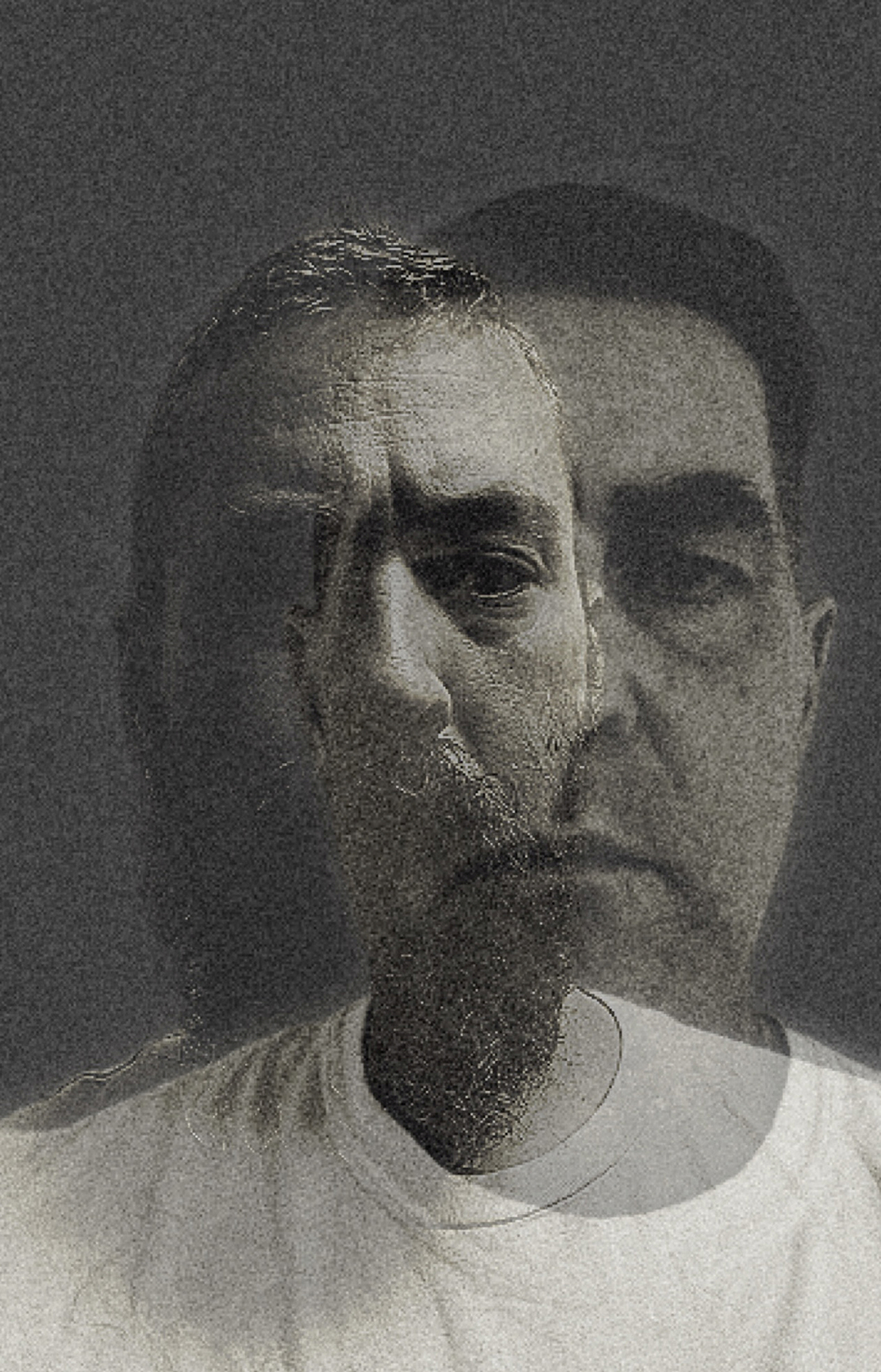
How did you first get to know each other and how did that lead to forming Collapse Culture?
Graham Scala: Ian and I were both in a secretive online group dedicated to sharing interesting music (I may have said too much already) and have known each other online for sometime. Still have never met in person.
Ian Miller: I’d totally forgotten that! It seems like I’ve just known you forever.
Did you have this particular sound in mind already at the beginning of your venture or did it evolve during the time together?
Graham Scala: I wasn’t exactly sure what specific sound I had in mind at the beginning. This was originally a recording project undertaken during quarantine to retain some shred of sanity. I enjoy a lot of dance-oriented electronic music but had never attempted to make it before and thought it could be interesting to try. I was still learning the process of using much of the software I rely on so the initial results were a little darker and more atmospheric than dancy (if you can’t make it good, make it experimental) but the longer we operate the more we reconcile those different parts of our sound.
You have a brand new album out. How long did you work on ‘Drag Your Coffin My Lord’ and did you find the lockdown creative?
Graham Scala: So our first album was our lockdown recording and ‘Drag Your Coffin My Lord’ was undertaken afterwards. It’s been almost two years of recording, re-recording, mixing, re-mixing, mastering, re-mastering, and re-re-mastering. I taught myself how to do a lot of the more technical aspects of music making (or rather I’m still teaching myself – it’s a constant work in progress) for purely practical reasons – I make music at such a rapid pace that I’d never be able to release it all if I had to pay someone to do all the hard, tedious work.
Ian Miller: Making music was indispensable for me during shelter in place. I wrote and recorded a ton of stuff, including participating in the Collapse Culture record. I don’t know what I would’ve done without that outlet.
“I like to think of each album I work on as a self-contained narrative”
Would you agree that the album itself is a continuation of your debut release?
Graham Scala: That was the intention. I like to think of each album I work on as a self-contained narrative, an attempt at world building with a cohesive trajectory. I think with the second release I attempted both to approach it that way internally but also to let the second album flow in tandem with the first.
Ian Miller: As much as I like the first record, ‘Drag Your Coffin My Lord’ is a major step forward. I think we came closer to achieving the sounds we heard in our head this time out.
You have a common background in the underground scene of heavy rock, how come you decided to make this adventure?
Graham Scala: We both have extensively eclectic taste in music. Personally I get extremely bored listening to the same thing (or even the same genre) for too long so it was natural for my aesthetic restlessness to affect the way I produce music. I’ve loved electronic music since I got into ambient as a pretty young kid and wanted to explore making it for quite a while but it’s only been in recent years that the technology for making it was within my budget so I’ve tried to make up for lost time with this and some of my other non-rock band projects.
Would you like to talk about the gear, effects et cetera you used for the album?
Graham Scala: Ian’s more the hardware guy. I used a three hundred dollar laptop that was on the brink of falling apart the whole time. It was definitely not designed to run a DAW and the things I asked it to do were pretty far past the things of which it was capable.
Ian Miller: Haha! My setup is pretty simple: I track bass into the box, add effects (Line 6 Helix being the primary and most important), and send the tracks off to Graham. I did contribute a little synth and other sounds this time out, all of which were generated in Reason.
Can you share some further words about the recording and producing process?
Graham Scala: It’s a pretty straightforward process. I usually start with a skeleton of a track then will send it to Ian who adds bass and/or synth. He sends it back to me, I add more then contort and mutate the results using some granular synthesis software I’m particularly fond of. I then handle the mixing, mastering, and art.
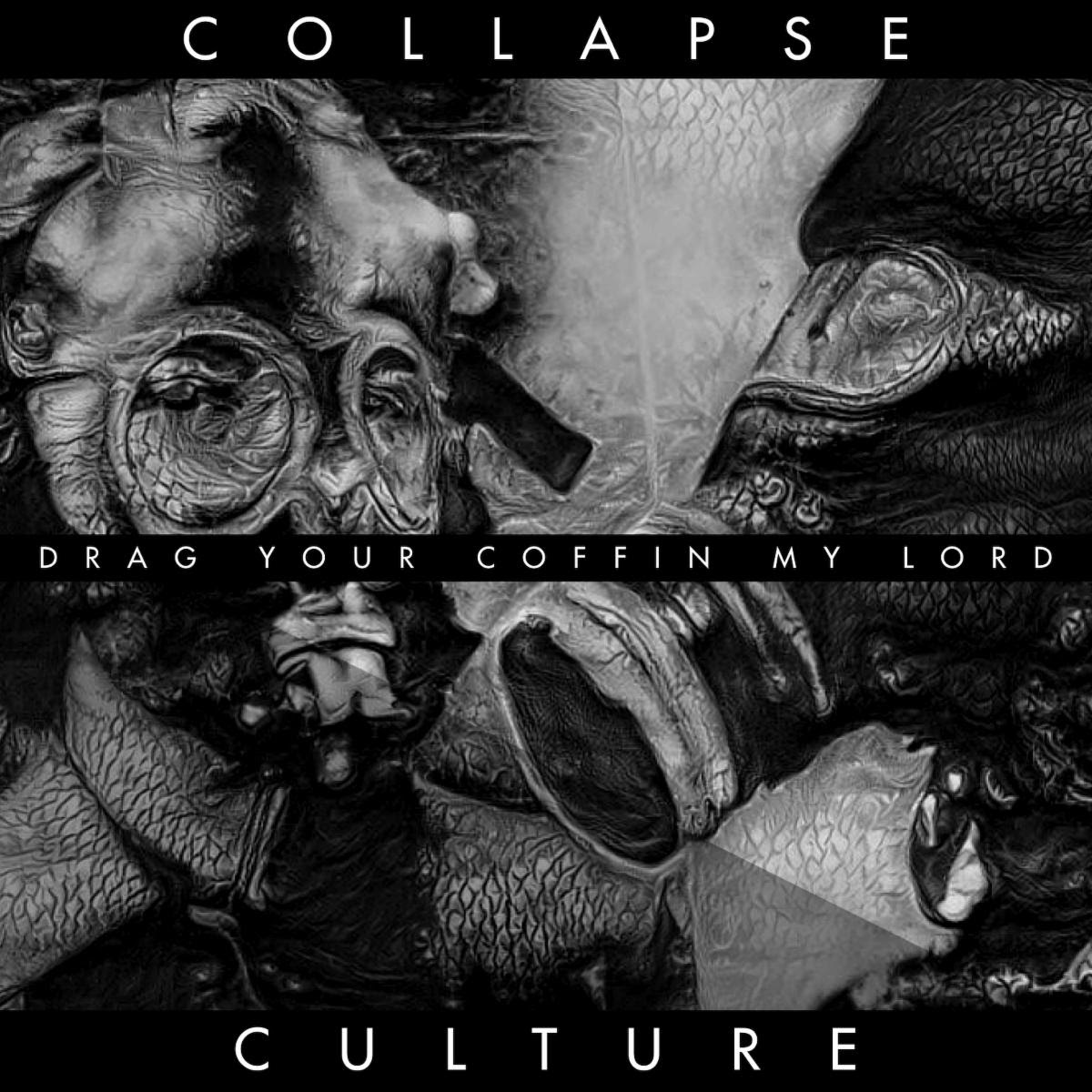
Are there any particular records that inspired the creation of your latest album?
Graham Scala: Overall the project was primarily influenced by artists like Bill Laswell, Burial, Gaika, Biosphere, and Basic Channel. Since the newest album was one that saw the sound expanding outwards, I was drawing on a pretty wide variety of artists like Sault, Scientist, Flux Of Pink Indians (‘Uncarved Block’-era), DJ Spooky, and Susumu Yokota.
Ian Miller: Always Laswell for me. That man is amazing. But my playing is informed by generations of reggae and dub bassists, primarily Family Man Barrett, Robbie Shakespeare, Flabba Holt, Jackie Jackson, and tons more.
This might be a bit difficult to answer, but still, would you like to share a bit of an overview about your involvement with other bands. Ian, [Miller] Kowloon Walled City, Interesting Times Gang, Stangelight) and Graham [Scala], Bleach Everything, US Christmas, Interstitia?
Graham Scala: I’ve been playing in bands for twenty-five years or so. I got my start in basement shows DIY punk and indie rock with bands like Operation Latte Thunder and Ex-Holiday who never really got much notoriety outside Richmond but have explored many varied corners of underground music. Probably the first band anyone really listened to on any appreciable scale was an instrumental space rock band called Souvenir’s Young America that toured regularly and released a few albums ten or fifteen years ago. Towards the tail end of that I was a member of the last lineup of Forensics with whom I made one record and toured a good amount. When Forensics ceased to be, half of that band reconvened as Highness who – though I bristle at the term “supergroup” – definitely had the term applied to us. Highness was probably the first time I’d ever done anything remotely resembling poppy or accessible music and I’m still proud of the way I could channel some of my freer/stranger musical impulses into something listenable. As that band’s members were split between Virginia and New York we often found ourselves with a fair amount of time in between engagements so the Virginia contingent started Bleach Everything, initially an attempt to make absurd sixty-second hardcore punk blasts that has gradually evolved into something far more experimental. We currently have an album we’ve been working on for a few years (with members currently spread all over the country our work happens gradually) that mixes fast hardcore with elements of shoegaze, psychedelia, and experimental electronic music in a way I’ve always wanted to hear but never actually heard. After relocating to Asheville, North Carolina several years ago I found myself without a regular band and was eventually asked to join US Christmas who I had been a huge fan of for years. Their albums on Neurot and Relapse are old favorites of mine – I’ve been an obsessive music nerd for decades but they’re a rare band that didn’t really sound like anyone else. Their work was raw and unvarnished while also being subtle and expansive, indebted to tradition while always looking forward. Covid put a serious damper on our momentum but we’ve been gradually working on playing live and writing new material.
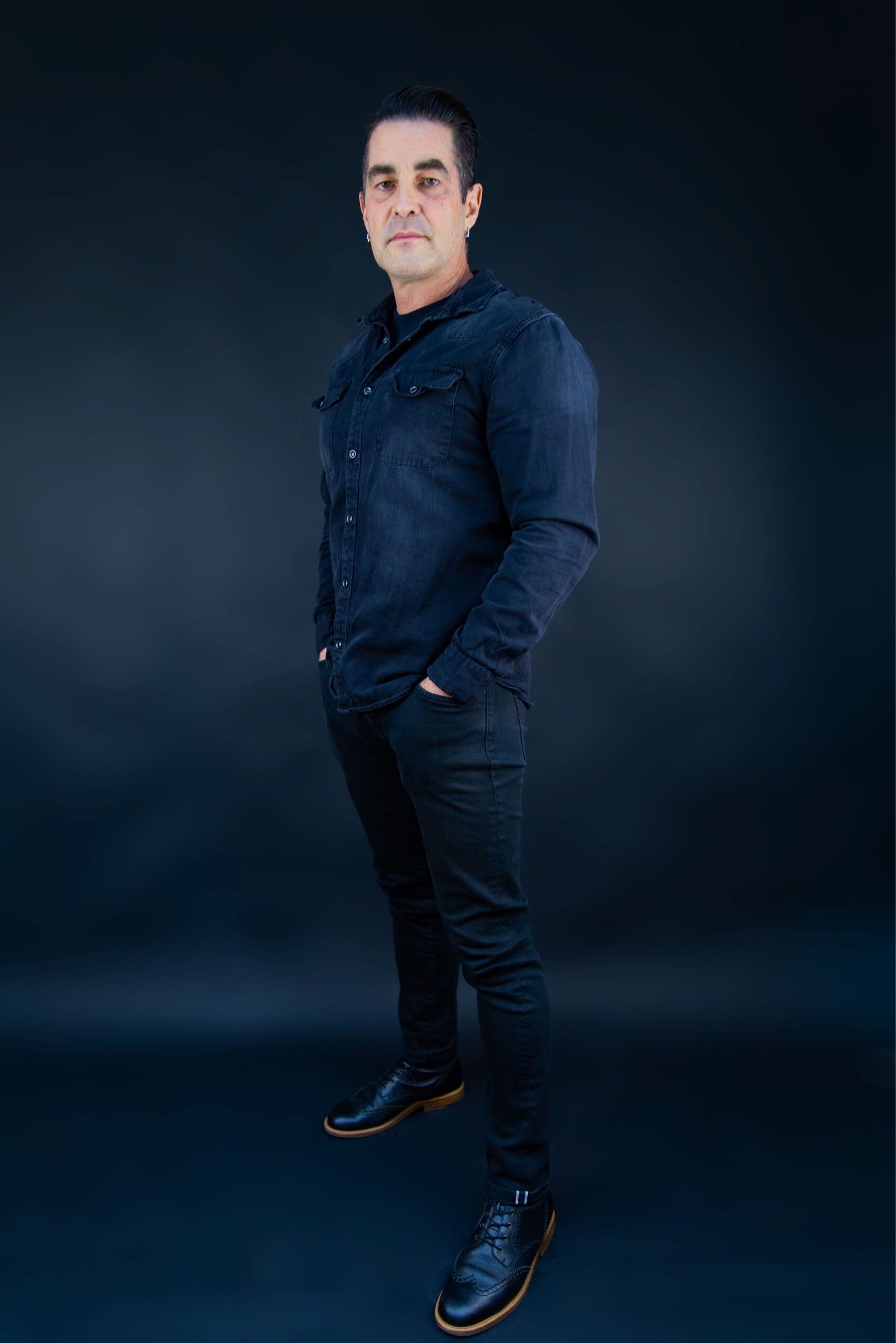
There was also a parallel narrative to the band-related stuff as well. Around 2004 or 2005 when I was between bands I started to experiment with sound manipulation and granular synthesis, eventually releasing an album of deep listening drone as ‘Ventoux.’ That album was one of my earliest associations with people like Brent Eyestone and Ryan Parrish with whom I’d work with in Bleach Everything, Forensics, and Highness and set an alternative course for us all in which we could step outside the bounds of conventional songwriting and instrumentation. In collaboration with friends (primarily from those bands) we have undertaken projects as Meditative Sect, Sonic Victimization Unit, and Harmonic Cross (the latter of which has an album due out in October with an accompanying film to be released sometime in the near future) – all dedicated to freeform experimentation and atmosphere. In the immediate aftermath of my relocation, when I was between bands, I started to explore making electronic music on a cheap laptop. The deep dive I took quickly produced Interstitia which was my attempt to make something outside the darker/harsher aesthetic I normally gravitate towards. Covid quarantine and the subsequent years produced two Interstitia full-lengths (with another recently completed), as well as Arepo (a long-distance collaboration with Ryan Parrish, one of my most valued friends and collaborators with whom I’ve been in probably half a dozen bands at this point), and Collapse Culture, my first attempt to make anything someone could dance to (whether we succeeded or not is up for debate).

It’s wild to think back on everything I’ve done over the years. I might not be particularly well-known but I’ve played with a lot of people I respect and managed to achieve nearly every artistic goal I’ve ever had.
Ian Miller: I’ve played in bands my whole life, it feels like. Notable ones since I moved to the Bay Area have been All You Can Eat, Skankin’ Pickle, Redemption 87, Kowloon Walled City, Less Art, and a few others.
I used to be pen pals with Devon Morf from AYCE and Conquest for Death. The day I moved to Oakland, he hit me up about playing bass in All You Can Eat, and that was my first band here.
From there I started a ska-punk band called Hoodlum Empire that played a bunch of shows with Skankin’ Pickle. I knew those folks pretty well and taught them occasionally, and they asked me to join when they kicked out the original bassist.
I kinda got burned out on the ska thing and wanted to go back to my hardcore roots, so Eric Ozenne, Tim Chunks, and I started Redemption 87. That was super fun and we made a couple of records, both of which have just been reissued, coincidentally!
After that I bounced around doing a bunch of different things, including a post-hardcore band called the Scheme with members of Lifetime and Drowningman. I think there are some demos floating around online if you’re curious.
In the mid-2000s I joined Kowloon Walled City; that band has been me and Scott since the start. I basically show up and play bass.
Interesting Times Gang is entirely me: beats, synths, basses, guitars, occasional vocals, mixing, mastering, marketing, etc. It’s all done in the box in Reason and Reaper. I find it difficult to describe, just listen to it if you’re curious.
Strangelight is a punk/post-punk band I play in with friends, it’s SoCal-style stuff, like a collision of Jehu and D.I. or something. Half the band used to be in Transistor, Transistor. In that context I get to go off a little more, I’m usually trying to channel William Mysterious from the Rezillos.
I also play in a project called Less Art: that’s me and Jon from KWC, Ed and Riley from Thrice, and Mike from Curl Up and Die on vocals. We released one album a few years back and it’s been dormant, but there are noises about becoming undormant again.
Let’s end this interview with some of your favourite albums. Have you found something new lately you would like to recommend to our readers?
Graham Scala: Though I have a room full of records I love deeply if I had to make a list of my top ten albums of all time off the top of my head I’d probably say (in no particular order): Songs: Ohia – ‘Didn’t It Rain,’ New Model Army – ‘The Ghost Of Cain,’ Burial – ‘Burial,’ Killing Joke – ‘Absolute Dissent,’ Neu! – ’75,’ Alice Coltrane – ‘Journey In Satchidananda,’ Slowdive – ‘Pygmalion,’ Steve Reich – ‘Music For Eighteen Musicians,’ GZA – ‘Liquid Swords,’ Scientist – ‘Scientific Dub.’
As for newer music – I mentioned earlier I get bored listening to the same thing so I’m compulsively looking for new work I enjoy. As far as music released this year I’ve been regularly listening to Rachika Nayar, High Vis, Haress, Daniel Bachman, and a lot of the newer Ugandan rappers like MC Yallah and Ecko Bazz.
Ian Miller: I haven’t been listening to a ton of heavy music lately, but the new Stray from the Path record has been soundtracking my workouts lately. I’m really enjoying the advance tracks from the forthcoming Carly Rae Jepsen record, and will be playing that heavy when it comes out next month. This summer was all about grime and drill stuff, especially Pa Salieu. I always try to keep up on new releases but honestly I’ve been listening to a ton of shit from my youth, like KMD and the first 6 Van Halen records. Oh, and a friend put me on to Yebba Live at Electric Lady, which is one of the best things I’ve heard in ages. She’s a phenomenal singer, and Questlove and Pino Palladino are a god-tier rhythm section. Find it on YouTube and have your mind blown.
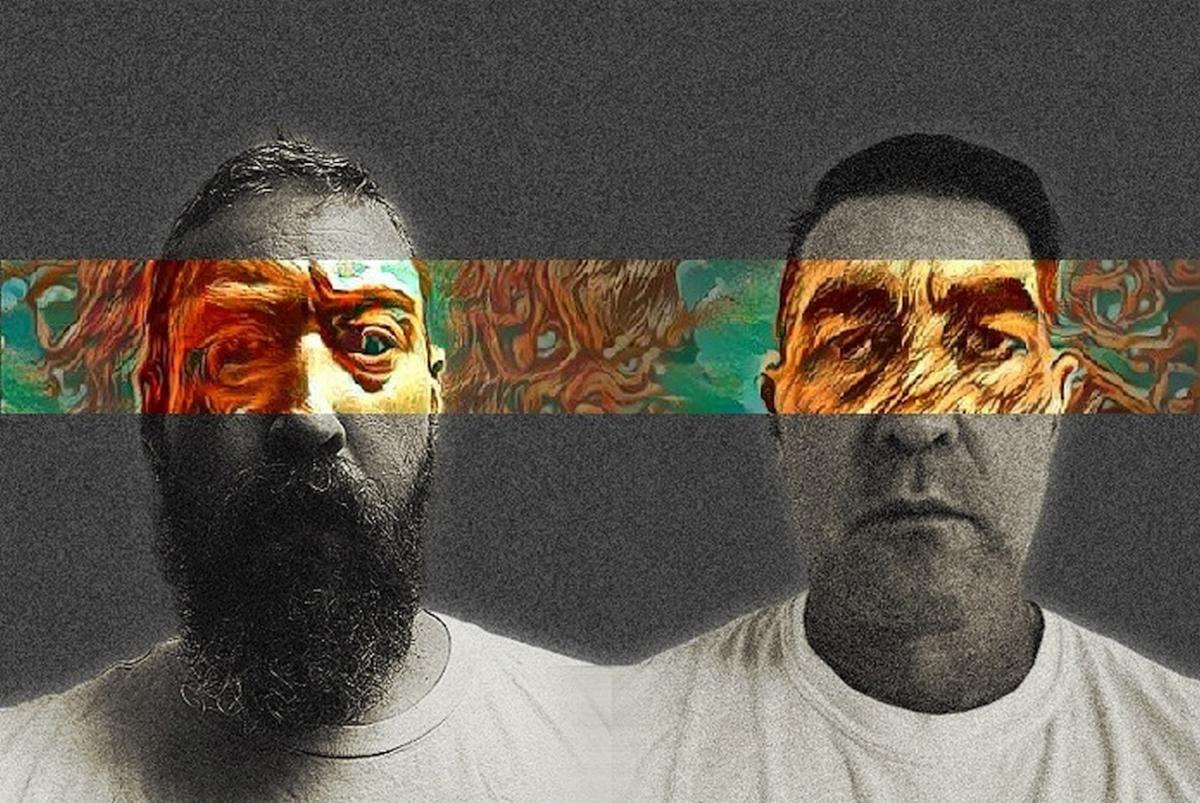
Thank you. Last word is yours.
Graham Scala: Thanks for taking the time to speak with us, we really appreciate anyone who’s checked us out so far. Our third album is well underway so hopefully more can be heard from us soon.
Ian Miller: Thank you!
Klemen Breznikar
Collapse Culture Instagram / Spotify / Bandcamp
Pax Aeternum Facebook / Instagram / Twitter / Bandcamp

